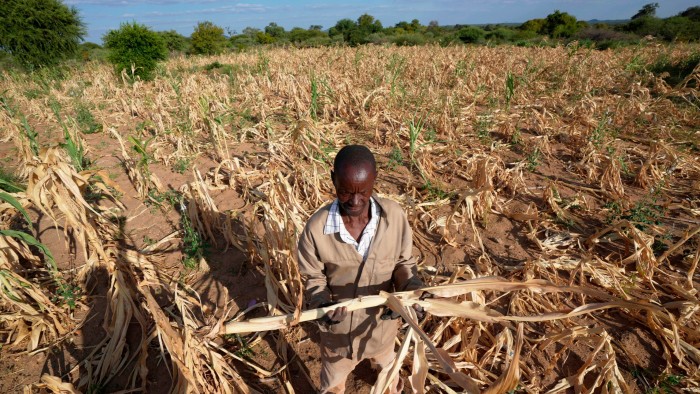The UN desertification COP16 summit hosted by Saudi Arabia ended without an agreement on a legally-binding response to drought, as the UN process struggles to overcome differences with fossil fuel producing nations.
It follows the failure to reach a final resolution at the UN biodiversity summit in Colombia, where talks ran into overtime, while the UN plastics treaty latest round in South Korea was similarly thwarted by objections from countries including Saudi Arabia and Russia.
Held under the theme “Our Land. Our Future” over two weeks in Riyadh, COP16 was the largest UN land conference to date, involving almost 200 countries, as well as civil society and indigenous peoples’ groups. It concluded early on Saturday morning, later than its scheduled Friday close, as poorer countries pushed for a binding outcome on drought.
UN Convention to Combat Desertification (UNCCD) executive secretary Ibrahim Thiaw told the final plenary that “parties need more time to agree on the best way forward as to how to address the critical issue of drought”.
Thiaw said the groundwork had been laid for a future global drought response regime, with discussions to continue at the next COP17 in Mongolia in 2026.
The most significant outcome at the Saudi-hosted event was more than $12bn in new pledges for land restoration and drought preparedness under the banner of the Riyadh Global Drought Resilience Partnership.
The outcome highlighted two striking dimensions of Saudi Arabia’s role on environmental issues. Under Crown Prince Mohammed bin Salman, the kingdom has sought to be a major player in the global arena by launching local and regional initiatives aimed at cutting the greenhouse gas emissions, but without curbing oil and gas production. The emissions from the burning of fossil fuels is the biggest contributor to climate change.
The Saudi Green Initiatives aims to reduce carbon emissions by 278 metric tonnes a year by 2030 and reach net zero by 2060. The kingdom also launched a Green Middle East Initiative which set a target of cutting more than 60 per cent of emissions from regional hydrocarbon production and planting 50bn trees.
But as Saudi Arabia continues to rely on oil revenues to fund myriad projects launched in recent years as part of a plan to diversify its economy, the kingdom has repeatedly been identified by international negotiators for stymying discussions to combat climate change.
It is accused not only of attempting to collapse efforts on the shift away from fossil fuels agreed at COP28 last year, but also of blocking action on wider issues such as the gender-related impact of climate change at the COP29 climate summit in Baku in November.
The only direct reference to climate change in the UN desertification summit final plenary came when UN executive secretary Thiaw regarded the “interconnected challenges, such as climate change, biodiversity loss, food insecurity, migration and global security”.
Saudi officials have objected to the accusations it is seeking to block consensus on climate-related issues. They point to the hosting of events such as COP16, the largest UN land conference to date, as showing their commitment to environmental issues.
“Of course, it is no secret Saudi Arabia’s economy heavily relies on oil revenues and there is definitely a huge pressure to address oil usage to cut CO₂ emissions,” Osama Faqeeha, the Saudi deputy minister of environment, told the Financial Times earlier this year. “Yet Saudi Arabia is constructively engaging with the global community. We have signed [the] Paris agreement.”
“What we are saying is oil is not the devil. Oil is the raw material . . . It is the emissions you have to try to [address],” he added, highlighting the kingdom’s plan to generate half of its energy from renewable sources by 2030.
Several western countries said Saudi Arabia had tried to push for weak language on climate change both in the G20 talks and for the UN pact for the future, as well as at other international discussions.
One minister of a G7 country said there had been “unbelievable pressure” from Saudi Arabia this year. Another negotiator from a G20 country said: “They are really negotiating hard.”
Swedish climate ambassador Mattias Frumerie, who was the head of the delegation at COP29, said the blocking tactics there by Saudi Arabia had escalated, even as the EU had agreed to increased climate finance.
“As we are progressing with the energy transition, and we are indeed progressing, as that progression accelerates, the blocking action we are seeing from countries like Saudi Arabia, let’s be frank, are increasing. And that’s something we saw across the board in so many different rooms this year at COP29,” he told the FT’s Global Boardroom event this month.
Austria’s minister for climate action, Leonore Gewessler, who co-led negotiations on adaptation at COP29, also told the FT that the discussions were “taken hostage”.
For COP16, Saudi Arabia built a new venue to host the summit in northwestern Riyadh. The country’s great wealth and strategic position in the Middle East meant that the biennial summit this year received more interest from other countries than previous desertification COPs.
The talks in Riyadh had appeared to be off to a smooth start due to the fact that the issues of land degradation and desertification are seen as the least controversial on the climate agenda. “Saudi Arabia wanted to elevate it and own it,” said a person familiar with the thinking of the kingdom.
But as talks progressed towards their scheduled Friday close, tensions emerged over Saudi refusal to include any reference to climate in the agreement, according to one person briefed on the talks.
In the end, the talks concluded with the procedural decision to return to the subject of drought at the next summit. Droughts “fuelled by human destruction of the environment” cost the world more than $300bn a year and are projected to affect 75 per cent of the world’s population by 2050, the UN said in a report published during the Riyadh summit.
Read the full article here

